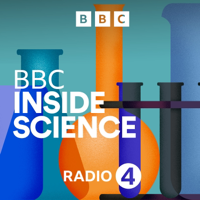
BBC Inside Science Podcast
1) Does new science get us closer to finding out how life on earth began?
Perhaps it’s the biggest question science has left to answer, how did life begin? Now, molecular biologists in Cambridge university have discovered tiny molecules of RNA which they say might provide s...Show More
2) How to bury radioactive waste
A small but mighty problem: what to do with the radioactive waste we have already made? Professor Clare Corkhill from the University of Bristol gives us the run down on how radioactive waste is create...Show More
3) Will there be a city on the moon in ten years?
Elon Musk says his company Space X will focus on establishing a ‘self-growing city’ on the moon before going to Mars. Why the pivot? And what would it take to build a lunar metropolis? Victoria Gill s...Show More
4) Where do forever chemicals come from?
This week the UK Government decided it was worried enough about so called ‘forever chemicals’ to bring in it’s first ever plan to tackle them. Environment Minister Emma Hardy called PFAS "one of the m...Show More
5) Should we rethink navigating by GPS?
This week 14 European countries warned that “maritime safety and security” was being put in jeopardy by Russian interference. The Royal Institute of Navigation says GPS is so vulnerable to so called ‘...Show More
6) How is air travel returning to supersonic speeds?
It’s exactly half a century since two Concorde jets took off from Paris and London respectively. The supersonic jet would come to define top end luxury travel. But Concorde has also been retired for n...Show More
7) Why is Nasa sending people around the moon?
The space science world is buzzing. In the next few days, NASA is expected to begin the rollout of its Artemis II rocket to the launch pad with the launch itself expected as early as February. Science...Show More
8) How rare are Greenland’s rare earth elements?
President Trump has his sights set on Greenland. If he succeeds, what mineral wealth will he find there? Adrian Finch, Professor of Geology at St Andrews University has been visiting Greenland for mor...Show More
9) How did President Trump transform science in 2025?
This week President Trump’s director of the Office of Management and Budget announced that a major climate research centre would be broken up. 2025 has brought a wave of reorganisations and funding cu...Show More
10) Would our ancestors have benefited from early neanderthals making fire?
400 thousand years ago our early human cousins dropped a lighter in a field in the East of England; evidence that was uncovered this week and suggests that early neanderthals might have made fire 350 ...Show More